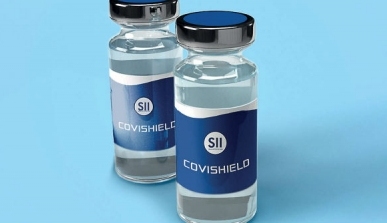New Delhi: With a reputation as the ‘pharmacy of the world’, India’s inoculation drive, dubbed the world’s largest and most ambitious, has been anchored on two home-grown vaccine makers who took a huge gamble once the pandemic began to unfold, overhauling assembly line and sacrificing some of the existing products in anticipation of a COVID-19 vaccine.
In early May last year, Pune-based Serum Institute of India (SII), the world’s largest vaccine maker, received a tiny 1-millilitre vial from Oxford, England, containing the cellular material for the vaccine, which kicked off the work on mass production of the vaccine.
As the pandemic began to unfold, SII CEO Adar Poonawalla gambled to strike deals to secure coronavirus vaccine licenses.
SII overhauled assembly lines to crank out 5,000 doses of vaccine per minute, even before the clinical trials ended.
It had already produced around 40 million doses before the phase-III results of Oxford-AstraZeneca vaccine, named Covishield, were known.
A little later, Hyderabad-based Bharat Biotech started work on a ‘desi’ or ‘Made-in-India’ vaccine, Covaxin.
As the COVID-19 pandemic ravaged the world and India, all eyes were on the country’s vaccine manufacturers for large-scale production and supply of coronavirus vaccines as it contributes around 60 per cent of the global vaccine production.
More than 1 crore cases and around 1.5 lakh fatalities later, India took its first steps out of the pandemic with shots of Covishield and Covaxin vaccines being administered at medical centres across the country.
The journey of the two vaccines started in 2020. In April, SII announced its partnership with Oxford University for COVID-19 vaccine.
“We have partnered with the Oxford University vaccine project as one of the seven global institutions manufacturing the vaccine,” Poonawalla had said in a statement.
He said SII had undertaken the decision to initiate manufacturing of vaccine at its own risk.
The decision was solely taken to have a jump-start on manufacturing, to have enough doses available, if the clinical trials proved successful.
The company also started clinical trials of the vaccine in India and in August said that the phase-III trials for the Oxford-AstraZeneca vaccine were underway.
However, the trials hit a roadblock in September, with the company receiving a show-cause notice from the central drug regulator for not informing it about AstraZeneca pausing clinical trials of the Oxford vaccine candidate for COVID-19 in other countries.
The company was, however, given permission to resume clinical trials in September itself.
In November, AstraZeneca announced that its COVID-19 vaccine candidate was 70 per cent effective on average.
During the month, SII also said that it was in the process of applying for an emergency use licensure for AstraZeneca-Oxford’s COVID-19 vaccine candidate in India in the next two weeks.
There were challenges too, with a participant in the clinical trials alleging serious side effects due to the vaccine, a charge that was firmly rejected by the company.
The other vaccine maker, Hyderabad-based Bharat Biotech has developed Covaxin indigenously in collaboration with the Indian Council of Medical Research (ICMR).
The company had received permission from the Drug Controller General of India (DCGI) for conducting the phase-I and II clinical trials of its COVID-19 vaccine.
In October last year, it applied to the DCGI for conducting phase-III randomised double-blind placebo-controlled multicentre trial of its COVID-19 vaccine.
The company was in spotlight in December, when Haryana Health Minister Anil Vij tested positive for coronavirus, days after participating in the trial of Covaxin. He had participated in a trial on November 20, 2020.
At that time, Bharat Biotech had said its vaccine was safe and efficacious and had pointed out that Covaxin was based on a two-dose schedule and its efficacy was to be determined 14 days post the second dosage.
Similarly, the company had also said that the death of a volunteer in Bhopal, who took a shot of Covaxin as part of the phase-III clinical trials, was not related to the medication.
Bharat Biotech has also inked a pact with Precisa Medicamentos, a Brazilian company, to supply the COVID-19 vaccine candidate to the Latin American country.
The long wait for regulatory approval finally came to an end for both vaccine manufacturers on January 3, with India’s drug regulator approving Covishield and Covaxin for restricted emergency use in the country, paving the way for a massive innoculation drive.
PTI






































